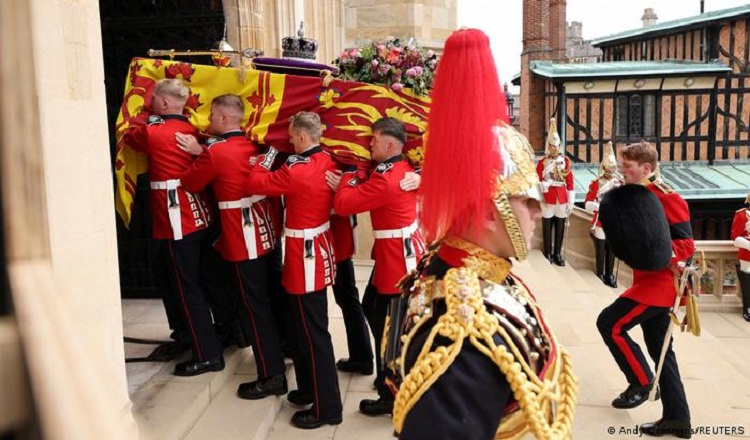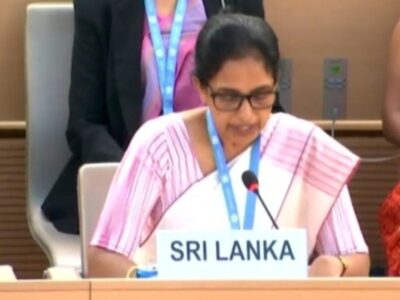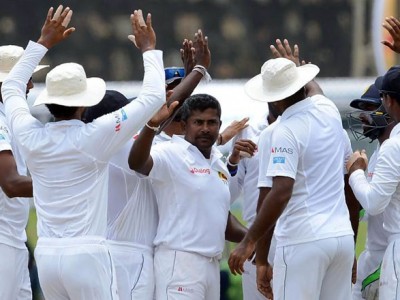(LANKAPUVATH | COLOMBO) –The nation has paid a final farewell to Queen Elizabeth II, with a state funeral and military procession.
World leaders and foreign royalty joined King Charles III and the Royal Family in the congregation at Westminster Abbey.
Hundreds of thousands of people lined the streets as the coffin was taken to Windsor where she was laid to rest.
At the funeral, the Dean of Westminster paid tribute to the Queen’s “lifelong sense of duty”.
The Very Rev David Hoyle spoke of her “unswerving commitment to a high calling over so many years as Queen and Head of the Commonwealth”.
The day began with final respects being paid by members of the public who had queued up to see the Queen’s lying-in-state in Westminster Hall.
Then, in a spectacle not seen for generations, her coffin – on the State Gun Carriage of the Royal Navy, drawn by 142 sailors – was taken in a solemn procession to Westminster Abbey.
King Charles III walked alongside his siblings, Princess Anne and Princes Andrew and Edward. The Prince of Wales and the Duke of Sussex walked side-by-side behind their father along a route lined by representatives of all parts of the military.
As the funeral procession entered the abbey, world leaders, politicians and foreign royalty stood as her coffin was carried up the aisle to be placed on a catafalque, draped in the royal standard with the Imperial State Crown, orb and sceptre on top.
Some of the youngest members of the family were in attendance at the abbey – the Queen’s great-grandchildren Prince George and Princess Charlotte, aged nine and seven, sat with their parents the Prince and Princess of Wales.
Prime Minister Liz Truss and her husband Hugh O’Leary were present alongside cabinet ministers and all of the UK’s surviving former prime ministers, seated in the abbey’s quire.
About 100 presidents and heads of government joined the 2,000-strong congregation at the abbey – as well as US President Joe Biden and his wife, Jill, there were French President Emmanuel Macron, New Zealand Prime Minister Jacinda Ardern, Canadian PM Justin Trudeau, South Korean President Yoon Suk-yeol and Chinese Vice-President Wang Qishan.
Europe’s royal families were strongly represented – with kings and queens from Denmark, Spain, Sweden, Norway, Belgium and The Netherlands. Denmark’s Queen Margrethe II – now Europe’s longest-reigning monarch – sat opposite King Charles close to the coffin.
The Emperor and Empress of Japan also attended, alongside other overseas royalty including Malaysia’s King and Queen and King Abdullah II and Queen Rania of Jordan.
The religious service heard church leaders highlight the affection in which the Queen has been held by many people.
The Archbishop of Canterbury Justin Welby said: “People of loving service are rare in any walk of life. Leaders of loving service are still rarer.
“But in all cases those who serve will be loved and remembered when those who cling to power and privileges are long forgotten.”
He also spoke of how the Queen had declared on her 21st birthday “that her whole life would be dedicated to serving the nation and Commonwealth”.
He added: “Rarely has such a promise been so well kept. Few leaders receive the outpouring of love we have seen.”
Westminster Abbey is bound up with parts of the Queen’s own personal history – it was where she was married and where her coronation took place. Her funeral heard Psalm 23 – The Lord Is My Shepherd, which was sung at her wedding.
As the abbey service came towards its end, the Last Post was played – by the same musicians who performed it at the Duke of Edinburgh’s funeral at Windsor last year – before the nation came to a standstill for two minutes’ silence.
The Queen’s piper then played a traditional lament before the King stood silently as the national anthem was sung.
Among the personal touches at the ceremony was a handwritten message from the King, which was placed on top of the coffin in a wreath of flowers cut from the gardens of Buckingham Palace, Highgrove House and Clarence House at his request. It read: “In loving and devoted memory. Charles R.”
The event was watched on television by millions of people across the country and around the world.
For those not invited, big screens were put up in cities across the UK, while some cinemas, pubs and other venues showed the event.
Thousands lined streets and gathered in parks around the capital to listen to the service, with many moved to tears.
It was the first state funeral since Sir Winston Churchill’s in 1965 and the biggest ceremonial event since World War Two.
After the funeral, the Queen’s coffin was taken by gun carriage to Wellington Arch and then on to its final journey to Windsor Castle and a committal service.
Throughout the route, many thousands of mourners lined up to make their own emotional farewell.
The procession passed through Horse Guards Parade, where the Queen had presided over scores of many Trooping the Colour ceremonies, and down the Mall – where it was greeted with cheers and applause.
As the Queen’s coffin passed Buckingham Palace for the last time, staff stood outside to say their final goodbyes.
The funeral cortege then drove the 28 miles from London to Windsor along a route that avoided motorways – to allow as many as possible to pay their final respects.
Thousands of people packed Windsor’s Long Walk as the Queen made her last journey to the castle, where she and Prince Philip spent the Covid lockdown.
One of those was Sandy Mar who camped overnight in order to catch a glimpse of the procession.
The 54-year-old said she was “very emotional” when she heard the news that the Queen had died and “cried like mad” when she saw the funeral procession.
“When she passed through the gate I felt very emotional,” Ms Mar said.
“I broke down, I cried like mad, I feel like we lost a good lady, we will never see a long-serving Queen like that again.”
The Queen’s two corgis made an appearance outside the chapel, while her fell pony Emma stood to one side as the procession made its way to the Queen’s final resting place.
The committal service was conducted by Dean of Windsor David Conner, with a blessing from the Archbishop of Canterbury.
As the service neared its end, the crown jeweller removed the instruments of state – the imperial state crown, the orb and sceptre – from the coffin before they were put on the altar, symbolising the end of the Queen’s reign.
King Charles then placed on the coffin a small crimson regimental flag called the Camp Colour – traditionally used to indicate the location of the commanding officer.
The Lord Chamberlain, former MI5 chief Lord Parker, also “broke” his wand of office and placed it on the coffin. The snapping of the staff signals the end of his service to the sovereign as her most senior official in the Royal Household.
The coffin was then lowered into the royal vault, before the Sovereign’s Piper played a lament.
The Queen was laid to rest on Monday night together with the Duke of Edinburgh at a private family service in the King George VI Memorial Chapel, located inside St George’s Chapel, a statement on the Royal Family’s official website said.
When Prince Philip died 17 months ago, his coffin was interred in the Royal Vault of St George’s – ready to be moved to the memorial chapel when the Queen died.
The Queen’s parents and sister Princess Margaret are also buried in the vault.
Unlike the rest of the day, the event was not televised. A senior palace official had said previously it would be “entirely private, given it is a deeply personal family occasion”.




